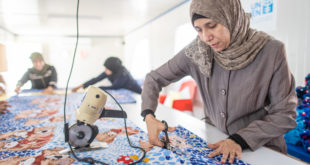Issue 30, summer/fall 2020 https://doi.org/10.70090/EBD20FIP Scroll down for the Arabic abstract. Abstract Despite the implementation of new business models in several Western media organizations, most Arab newspapers have not yet explored these models, and little is known about public attitudes towards their willingness to pay for online news. The study …
Read More »Arab World
Digital and Traditional Media’s Handling of Freedom Issues: A Comparative Study among Egyptian and Saudi Youth (Arabic)
Issue 30, summer/fall 2020 https://doi.org/10.70090/SEMA20SYA Scroll down for the Arabic abstract. Abstract With the expansion of the digital public sphere, tackling freedom issues has been widely transferred from traditional mass media to digital platforms. Based on the constructive approach that demonstrates the recipient’s active ability to give meaning to what …
Read More »Knowledge, understanding, and adherence to Social Media regulations by youth in the United Arab Emirates
Issue 30, summer/fall 2020 https://doi.org/10.70090/TS20KUAS Abstract The study deals with legislation and guidelines related to the use of virtual space, especially social media. A special focus has been placed on youth in the United Arab Emirates, where a set of regulations are being implemented, in addition to a series of …
Read More »The Effect of using Artificial Intelligence Technologies in Presenting News Stories in Virtual Reality Immersive Experiences (Arabic)
Issue 30, summer/fall 2020 https://doi.org/10.70090/MA20EUAI Scroll down for the Arabic abstract. Abstract This study aims at uncovering the effect of using artificial intelligence (AI) techniques on two levels of virtual reality (360° video and immersive 3D) while presenting news stories in recipients’ immersive experiences. To achieve this goal, a field …
Read More »From Peers to Professionals: Regulating Influencer Marketing in the United Arab Emirates
Issue 30, summer/fall 2020 https://doi.org/10.70090/JG20PPRI Introduction In their work on the regulation of social media influencers, Catalina Goanta and Sofia Ranchordás noted that the topic’s complexities involve, among other things, rethinking “the distinction between peers and professionals” (2019, 14). The United Arab Emirates in 2018 addressed this issue by essentially …
Read More »90 Day Orientalism: The “Other” Way
The American network TLCs’ 90 Day Fiancé’s casting and storylines have provided its audience with years of entertainment, mostly at the foreign partner’s expense. The reality television industry has grown exponentially throughout the years, thriving on the drama between characters to gain viewership. However, reality television channels, such as Bravo …
Read More »Trump, Twitter, and Regulation of Big Tech: Perspectives from the Arab World
The suspension of the Twitter account of former U.S. president Donald Trump after violating the platform’s publishing policies brought forth significant controversy and aroused many questions about the right to freedom of expression and its boundaries, not only in the United States, but across the globe. In the Arab region, …
Read More »Regional Media Debate the Strength of American Democracy
For a region that has had to deal with the aftermath of decades of U.S. intervention, occupation and punishing sanctions under the banner of democracy and human rights, the live pictures of American pro-Trump rioters storming the U.S. Capitol were nothing short of astounding. Public ridicule and scorn came fast …
Read More »Rami Khouri on Lebanon’s Outlook and What Has Happened to the Country’s Media
Issue 30, summer/fall 2020 https://doi.org/10.70090/SS29RKLOg On October 17, 2019, protests began in Lebanon with angry and largely disenfranchised citizens calling for a complete overhaul of the country’s unique political system. In the year that has followed, Lebanon has suffered through one disaster after another, with seemingly unending political shifting. On …
Read More »Info-Deficiency in an Infodemic: The Gender Digital Gap, Arab Women and the COVID-19 Pandemic
Issue 30, summer/fall 2020 https://doi.org/10.70090/SKEC29DI Abstract: This article tackles the complex struggles faced by Arab women, including multiple layers of invisibility, marginalization and inequality,[1] all of which have significantly worsened during the COVID-19 pandemic. This examination includes a special focus on how and why the “digital divide,” defined as the …
Read More » Arab Media & Society The Arab Media Hub
Arab Media & Society The Arab Media Hub










